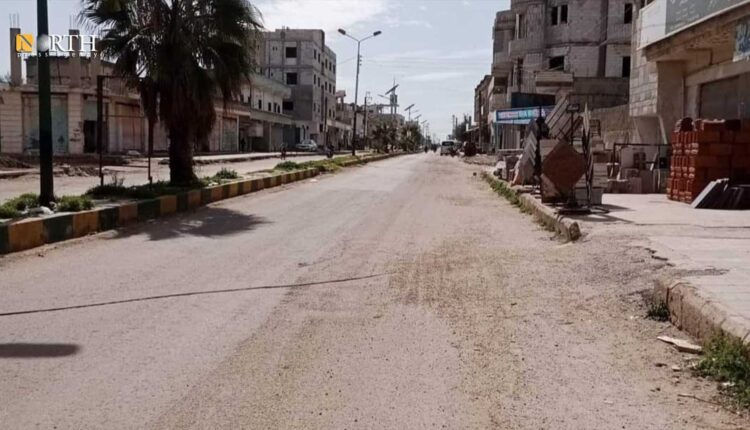Suspected Drug Dealer Killed in Syria’s Daraa as Drug Crisis Deepens in the Region
By Kardo Roj
In the latest episode of escalating violence tied to the illicit drug trade in southern Syria, a suspected drug dealer was killed in a targeted attack by unidentified gunmen in the town of Inkhil, north of Daraa, local sources confirmed to North Press Agency on Tuesday.
The victim, Qusai Ibrahim al-Dakhoul, had reportedly been involved in narcotics trafficking in the region and had previously faced allegations of theft, according to a local resident who spoke on the condition of anonymity.
Al-Dakhoul was recently expelled from Jordan approximately a year and a half ago, where authorities had detained him multiple times due to his involvement in criminal activities. His forced return to Syria underscores Daraa’s intensifying struggle with drug-related crime and violence, as the region faces a growing narcotics crisis.
Drug Crisis and Its Impact on Daraa
The city of Daraa, known as the birthplace of Syria’s 2011 uprising, has been grappling with a dramatic surge in drug trafficking and usage. As per various reports and local residents, this wave of illicit drug activity is fueling crime and social instability. Public frustration mounts, with residents attributing part of the blame to government neglect and alleged collusion with drug networks. Some security agencies are accused of tolerating and, at times, even enabling trafficking activities to benefit from the trade financially and politically.
Journalist Osama al-Miqdad, a Daraa native, highlighted the geographical challenges that make the region a hub for smuggling. “Daraa and the neighboring province of Sweida border Jordan, creating a strategic transit route for drugs destined for the Gulf and other parts of the Middle East,” he said in an interview with North Press.
Al-Miqdad explained that the region’s struggle with drug proliferation started to intensify after July 2018, when Syrian government forces and Iranian-backed groups assumed control over southern Syria. Since then, these groups, alongside certain security officials, have allegedly facilitated the establishment and protection of drug production facilities in the area.
The Societal Toll of Narcotics in Daraa
Local lawyer Iyad al-Zaabi spoke to North Press about the devastating impact of drug use on the province. “One of the most visible consequences is the rise in violent crime, especially kidnappings, murders, and robberies,” he noted.
Al-Zaabi further explained that young people, facing high unemployment and bleak futures, are particularly vulnerable to drug abuse and exploitation within these networks. In his assessment, the ease of access to drugs, a lack of preventative measures, and inadequate rehabilitation services contribute to the spiraling crisis.
In recent years, community leaders have proposed several strategies to address the addiction crisis, including establishing treatment centers and support programs for addicts. However, these initiatives have been stymied by a lack of funding and government support, leaving Daraa without critical resources to combat the growing social and health repercussions of drug addiction.
Allegations of High-Level Complicity and International Tensions
As the situation in Daraa deteriorates, some residents and observers allege that influential figures within Syria’s security apparatus, including members of the Fourth Division, are involved in the drug trade.
This division, led by President Bashar al-Assad’s brother Maher al-Assad, has been implicated in various reports as facilitating the production and distribution of narcotics. Furthermore, certain Iranian-affiliated militias in the region are said to be complicit, leveraging the drug trade to maintain influence and finance operations amid Syria’s ongoing conflict.
Al-Zaabi warned that unless authorities target the kingpins of the drug trade rather than low-level users and small-scale dealers, the drug crisis will persist. “The authorities’ focus on apprehending addicts rather than dismantling the major networks leaves the door open for this business to flourish,” he said, adding that unresolved social and economic issues fuel the demand for drugs and intensify crime rates, threatening family and social structures.
The Broader Implications of Daraa’s Drug Trade
The narcotics trade in Daraa, given its proximity to Jordan and potential for trafficking into the Gulf states, has implications that reach beyond Syria’s borders. Jordan has reported several high-profile drug interdictions at the Syrian border, drawing international concern and calls for a coordinated response to stem the flow of narcotics across the region.
Observers warn that without a comprehensive and sustained response from both local authorities and the international community, the drug trade in Daraa will continue to fuel violence, social disintegration, and regional instability. The issue poses a significant challenge to any future peace efforts in Syria and threatens to further isolate the region from efforts at stabilization and recovery.

